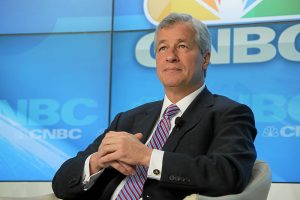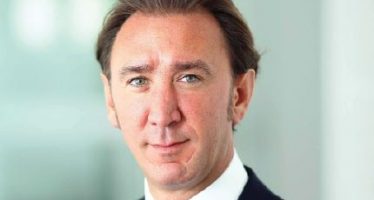Chairman and CEO of JPMorgan Chase Jamie Dimon: Outspoken, Ambitious, and Smart

Chairman and CEO of JPMorgan Chase: Jamie Dimon
He is the archetypal Davos Man and, as such, no stranger to controversy – or grand visions. What makes Jamie Dimon endearing is his eagerness to go out on the proverbial limb with bold statements that, at times, bespeak of a rather selective memory or a mind on overdrive.
In January, whilst at Davos for the annual World Economic Forum summit, the CEO of JPMorgan Chase suffered a bee in his bonnet and spontaneously embarked on a twelve-minute rant against socialism and all other forms of state interference with private enterprise. His conclusion: Governments are very bad at allocating capital.
That was a tiny bit rich for a banker who in 2012 admitted to getting the math horribly wrong on a series of singularly poky hedges – collectively known as the London Whale – which ended up in a pre-tax $2bn trading loss. A few years later, JPMorgan Chase needed $25 billion in Treasury support to keep its business afloat in the wake of the 2008 banking crisis.
Other than his slightly flippant thinking about politics and macroeconomic management, Dimon is a cautious banker, albeit one with a progressive streak, who recognises that in order to stay ahead a degree of boldness is called for.
Next year, JPMorgan Chase will try to shake up UK retail banking with the launch of an online challenger bank. In the US, an attempt at mobile banking was abandoned after only 18 months. After attracting only about 47,000 customers, Chase shuttered its Finn brand, funnelling some of the online bank’s most innovative features to the Chase mobile app.
Dimon ascribed the Finn failure to bad timing and gaps in customer care. In the UK, he hopes to cash in on the corona-inspired crash of branch-based banking. However, challengers linked to legacy banks have not been overly successful in the UK either with Natwest closing down its Bo mobile bank just six months after its introduction. Goldman Sachs has done a bit better with Marcus which managed to amass over 500,000 clients and accumulate some £21 billion in deposits. These numbers pale in comparison to domestic digital disruptors such as Starling, Revolut, and Monzo which jointly serve more than 17 million customers.
Fifteen years into his rein at JPMorgan Chase, Dimon is an industry veteran who has watched presidents, central bankers, and economic downturns come and go whilst navigating his financial behemoth. With over a quarter of a million employees and total assets of $2.7 trillion, JPMorgan Chase is ranked the largest bank in the US by S&P Global and the seventh largest in the world.
Exceptionally susceptible to market volatility and brusque swings in consumer confidence, the JPMorgan Chase CEO seems a bit unsettled by the pandemic and the prevailing lack of certainty. The bank is substantially adding to its already solid loan-loss provisions. During a recent conference call with investors, Dimon held out hope that the US economy may be more buoyant than previously thought and that he may have erred on the side of caution. The bank’s share price promptly spiked.
An avid commenter on current affairs, just as fellow New York business tycoon Mike Bloomberg, Dimon spent the better part of 2018 mulling a presidential run, ultimately deciding against it out of a justifiable conviction that no mainstream party would want a banker on the ticket. From his Park Avenue office, he did take a few swipes at the current occupant of the White House and assured that he could beat him in an election: “I’m as tough as he is, I’m smarter than he is.”
Instead of running for office, Dimon decided to share his thoughts with JPMorgan Chase shareholders, outlining his solutions – and, rather surprisingly, setting a good example. Dimon was the initiator of a $350 million job training programme targeted at underserved communities and seeking to equip people with the skills necessary to climb the corporate ladder. Last year, he also unveiled a $500 million bank-sponsored initiative to revitalise neglected inner cities. In his 51-page letter, Dimon expressed disappointment in party politics and in its inability to meet the social needs of many US citizens, before suggesting a Marshall Plan-like federal programme to fix US society: “If we don’t tackle the issues, America’s moral, economic, and military dominance may cease to exist.”
A banker with more than just pecuniary concerns: It may help explain why Dimon survives at the top and – uniquely – fails to make many enemies. Given the age cohort of the present crop of US political heavyweights, Jamie Dimon has ample time to consider a career change yet: He’s just 64.
You may have an interest in also reading…
Jakob von Ganske, Ph.D.: Taking Strategic Steps — and Keeping a Close Eye on Risks
Jakob is Head of Investment Consulting and Risk Management, and a member of the Extended Management Board at Deutsche Oppenheim
CFI.co Meets the Founder and CEO of Optimum Asset Management: Alberto Matta
It is difficult to find top-tier service levels in a small firm. Indeed, Optimum Asset Management offers an excellent level
CFI.co Meets the Chairman of Kuwait International Bank: Mohammed Al-Jarrah Al-Sabah
A seasoned veteran of the banking industry, Sheikh Mohammed Al-Jarrah Al-Sabah has served as chairman of Kuwait International Bank (KIB)


















































































